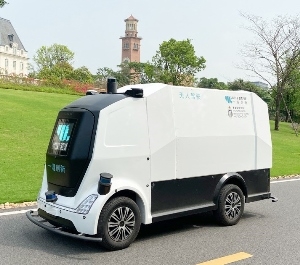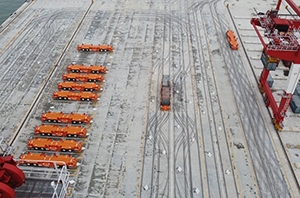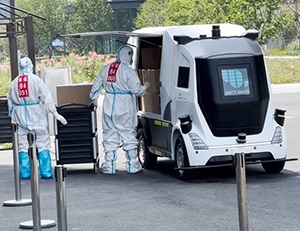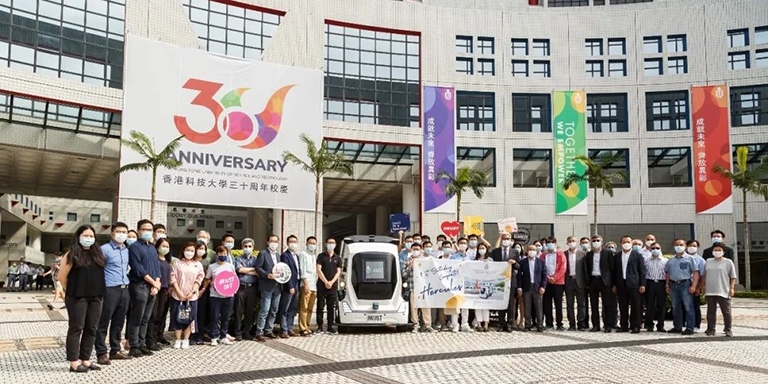Anyone who has programmed a computer and driven a car knows that developing a self-driving vehicle would require a herculean effort – hence the name of Hong Kong’s first self-driving vehicle.
Hercules was developed by Shenzhen Unity-Drive Innovation Technology (UDI), which in turn was founded by the Intelligent Autonomous Driving Technology Center of the Hong Kong University of Science and Technology (HKUST). UDI focuses on vehicles for industrial logistics, unmanned distribution, terminal operations and other scenarios, the company’s leading developer, Professor Ming Liu, said.
For their new vehicle, the team has delivered a level four autonomous transport solution (on a five-level scale ranging from assisted driving to a fully autonomous vehicles). “UDI has always maintained a good industry-university research cooperation relationship with HKUST. Hercules, the first self-driving car in Hong Kong, was jointly developed by UDI,” Prof Liu said.
Hercules went into service in HKUST in 2020 and has been operating normally for nearly two years. It was also the first unmanned vehicle to obtain a test licence from Hong Kong’s Transport Department, Prof Liu said.
Hercules is used for making point-to-point deliveries on campus with self-pickup cabinets, Prof Liu said. UDI has also tailor-made unmanned vehicles for delivery company SF Express to serve two universities in Shanghai, which made more than 1,000 express deliveries during the Singles Day (11/11) peak period.
Factory transport

Established in June 2018, UDI began with test runs in factories for firms such as Foxconn and Huawei. In 2020, it began providing low-speed unmanned vehicles in small batches for use in factories. The firm went on to produce the Smart Wharf IGV Navigation Solution, implemented on a large scale in Guangzhou Port. The unmanned transportation solution also operates in areas such as parks, factories and epidemic risk control areas, and the company has shipped hundreds of unmanned vehicles so far.
At present, unmanned vehicles are best employed in high-frequency, point-to-point services, so UDI is focusing its product direction on low-speed unmanned driving in controlled areas such as factories, warehouses and ports, Prof Liu said.
Hercules can plan and adopt its own routes so long as it has a detailed map of the environment, Prof Liu said. “Just as people need to know the driving trajectory through a map, the unmanned vehicle has a high-precision map [so it can determine] its own position and destination and plan its path.
“The body of the UDI unmanned vehicle is covered with various sensors such as LiDAR, camera and ultrasonic, which let the machine sense the surrounding environment in real time and can also autonomously plan and change the driving path when encountering obstacles.”
Port solution

The present Hercules can carry loads of nearly a tonne – a capacity of 800 kilograms and volume of 2,900 litres. The vehicles are mass-produced but can be adapted and configured for many different scenarios. UDI is developing a new vehicle that can carry up to 3 tonnes for use in locations such as airports and harbours.
“At present, our unmanned vehicle has been mass-produced and has been implemented in many scenarios such as the Shenzhen Foxconn factory and Shandong Zibo Industrial Park, covering a wide range of smart logistics, smart cities, smart ports, smart factory and other application fields,” Prof Liu said, adding that the actual operation has exceeded 30 months while the accumulated safe driving has exceeded 400,000 kilometres.
The unmanned logistics products market is worth hundreds of billions of dollars, he said. Faced with the prospects of limited labour as populations age, courier firm SF Express is looking for autonomous “last mile” delivery, which is appropriate for UDI’s low-speed, high-frequency point-to-point delivery model.
“In the past four years, UDI has accumulated benchmark customers in express logistics and industrial logistics, represented by SF Express, Foxconn, etc, and provides transportation-as-a-service (TaaS) solutions,” Prof Liu said.
“Our products include unmanned industrial logistics vehicles, unmanned delivery vehicles, unmanned shuttle vehicles, unmanned sweeping vehicles, unmanned security vehicles, unmanned retail vehicles, and technology for unmanned vehicles for use during epidemics. As policies and regulations improve, UDI will also expand the scope of unmanned vehicle applications to make UDI unmanned vehicles travel throughout cities.”
Since UDI provides TaaS, its vehicles can work in synchronised swarms. Prof Liu said UDI’s technology allowed for navigating through active traffic, though controlled environments remain the company’s core focus currently.
Mall shopping shipping
UDI's products also have Internet of Things (IoT) capabilities. “Last year, UDI worked together with [new Chinese tea brand] CoasTea to transform the carriages [of the unmanned vehicle] into retail cabinets for ‘new retailing’ in shopping malls with high customer traffic. Customers scanned a QR code to place an order without going to the store. Our unmanned retail vehicle can also capture the pedestrian volume and improve the efficiency of matching people and goods,” Prof Liu said, adding that UDI is looking to expand into other retail functions.
GBA opportunities
The Guangdong-Hong Kong-Macao Greater Bay Area (GBA) is well suited to technological innovation, Prof Liu said. “There are many commercial opportunities and requirements. UDI, which originated at HKUST, is based in Shenzhen and has established close cooperation within the GBA,” he explained.

“For example, the first unmanned vehicle test licence in Hong Kong is from UDI. In addition, we have participated in the Greater Bay Area Auto Show for two consecutive years to actively expand the resources of the GBA. In terms of market applications, UDI has put a number of unmanned vehicles on the market in Hong Kong, Shenzhen, Zhuhai, Guangzhou etc. At the same time, we provided IGV autonomous driving navigation solutions in Guangzhou Port, and provided unmanned vehicle technology anti-epidemic solutions in Shenzhen and other places.”
UDI is winning plaudits for its work, gaining the second Guangdong-Hong Kong-Macao Greater Bay Area Science and Technology Innovation Award and ranking in KPMG’s “Top 50 in Automobile Technology”.
Related links
HKUST Autonomous Driving
UDI
Video presentation

